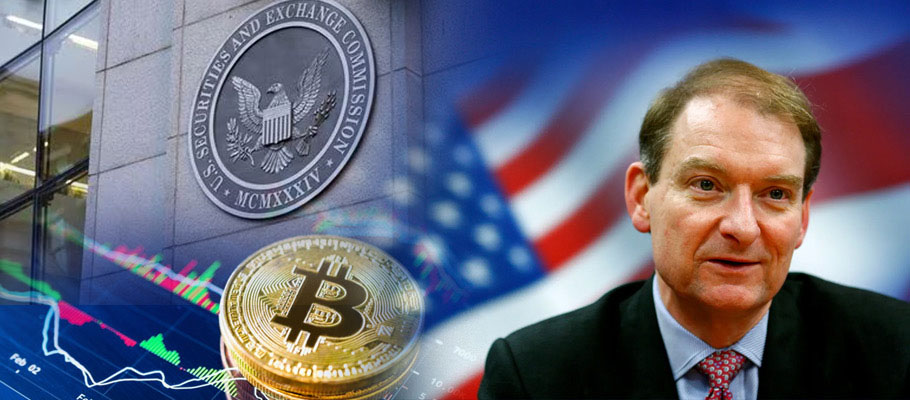
Published: April 23rd, 2025
Inbound SEC chair Paul Atkins was officially sworn in this week. Traders expect the 34th Chairman of the Securities and Exchange Commission will adopt a crypto-friendly approach to the agency's mandate, diverging sharply from his predecessor's punitive regulatory reign.
A majority of 52 Senate Republicans voted in favour of his nomination, while 44 Democrats voted against. Atkins said he will advance the financial watchdog's role as a ‘facilitator of capital formation,’ and ‘maintain fair, orderly, and efficient markets.’
In a statement made ahead of the confirmation hearing, Atkins said time spent in both the public and private sectors gave him the perspective to how regulation can ‘directly impact’ markets and investors.
Atkins' time in the private sector includes founding Patomak Partners, a finance consultancy devoted to creating standards for the cryptocurrency investment industry. Atkins said he'd leave his job as Patomak CEO within 90 days.
In March, left-wing Senator Elizabeth Warren (D-MA) demanded that Atkins clarify the role Patomak had played as an advisor to crypto firms like the infamous (and now failed) FTX exchange.
Atkins told the Senate confirmation hearing that that lack of clear regulatory rules for crypto ‘creates uncertainty and holds back innovation.’ He promised that his time leading the SEC would be focused on establishing a ‘rational, coherent, and principled approach.’
Atkins replaces Biden-era chair Gary Gensler, who led an anti-crypto enforcement regime targeting a number of crypto firms for alleged securities violations.
Acting Chair Mark Uyeda has already moved to dismiss most of Gensler's actions, while also removing meme coins and crypto mining from securities oversight.
In 2023 the The G20's finance watchdog warned that wider systemic risk was on the cards if crypto markets weren't reined in, and soon.
The Financial Stability Board (FSB) said the continuing fallout from that year's crypto catastrophes made it essential that financial regulators obtain greater oversight of the industry. The agency's global regulatory framework for crypto-assets was strongly influenced by the collapse of FTX and Terra.
To avoid similar risks, the FSB listed nine core recommendations for financial regulators as they attempt to control how crypto companies and the way markets operate. The agency also revised its guidance on regulatory rules for stablecoins.
The recommendations, which incorporated industry and investor feedback gathered during a public consultation on the topic, embedded greater cross-border collaboration between national and international agencies, mandatory disclosures for traders and investment firms, and more stringent governance for crypto issuers.
The FSB said its suggestions had become ‘more robust’ in the aftermath of recent crypto events, and now incorporate a push for stronger safeguarding of client assets, as well as measures to mitigate conflicts of interest.
‘The large-scale failures we've seen over the last 18 months spotlight how volatile crypto assets can be and point to structural vulnerabilities that could damage investors large and small,’ the Zurich-based agency said in a statement. ‘They also demonstrate how quickly failure in one part of the crypto-asset ecosystem can turn into contagion and contaminate other parts.’
The agency added that it expected more spillover of crises to occur as the crypto and traditional finance worlds become more intertwined.
Earlier this month, Hong Kong's Securities and Futures Commission (SFC) extended the licensing for digital asset trading firms to include staking services.
Explaining the move to attendees of Hong Kong's 2025 Web3 Festival, SFC Executive Director Christina Choi extolled the virtues of cryptocurrencies, saying digital assets could unleash financial innovation.
Staking enables crypto traders to set aside an amount of crypto to support blockchain governance or network improvements, earning rewards for the commitment. The SFC's new staking framework requires crypto trading platforms to keep custody of staked assets while sticking to established safeguards.
For example, licensed platforms will have to obtain agency approval before offering staking services, while demonstrating that they own or control all mechanisms for withdrawal of any staked assets.
The agency also requires that any risks associated with staking, including lock-up periods, penalties, unstacking processes, durations, and security vulnerabilities that could expose traders to hacking must be disclosed.
In July 2024, Britain's Financial Services and Markets Act became the law of the land, recognizing crypto trading as a regulated and legitimate financial services activity.
The UK reform bill, which was given Royal Assent by King Charles, was described in a Westminster press release as having the potential to give Britain's economy ‘a rocket boost.’
The new law made cryptocurrency trading subject to rules and regulations designed to protect investors, levelling the playing field by adding transparency, standard definitions, and risk mitigation to crypto trades. The amended Act defines digital assets as ‘cryptographically secured digital representations of contractual rights or underlying value,’ and labels them as regulated financial products, investments, or instruments.
A press release from the UK Treasury noted that the goal of the law is to regulate how crypto assets are traded and held in custody and ensure their safe adoption in the country. The new law is being touted by the government of Prime Minister Rishi Sunak as a much-needed modernisation of Britain's financial-services dependent economy.
‘This new law enables us to take back control of the UK's financial services regulatory regime,’ said Economic Secretary to the Treasury Andrew Griffith. ‘By replacing old EU laws set by bureaucrats in Brussels it has the potential to free up billions of Pounds in investment, money that could spur innovation and drive economic growth.’
In Britain's parliamentary procedure for enacting new laws, Royal Assent is the end of the legal process that makes a proposed bill the law of the land, turning it into an Act of Parliament. The bill passed a vote in the House of Commons and was approved by the House of Lords in late June 2024.